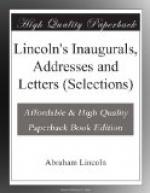Lincoln’s statement in the Autobiography that he had picked up the little advance he had made upon his early education, or rather lack of education, is altogether too modest. It is known that after his term in Congress he studied and mastered geometry; and, like Washington, he early became a successful surveyor. His study of the law, too, was characteristically thorough, and his skill in debate, in which he had no superior, was the result of careful preparation. During the presidential period Lincoln gave evidence of critical ability that is little short of marvellous in a man whose schooling amounted to less than a year. In a letter to the actor Hackett and in several conversations he analyzed passages from “Hamlet,” “Macbeth,” and other plays with an insight and sympathy that have rarely been surpassed even by eminent literary critics.
At an early age Lincoln’s interest was aroused in public speaking and he soon began to exercise himself in this direction and to attend meetings addressed by those skilled in the art of oratory. Many stories are told of his local reputation as a speaker and story-teller even before he moved to Illinois, much of his success then as in later life being due to the singular charm of his personality. Lincoln never overcame a certain awkwardness, almost uncouthness of appearance, and he never acquired the finer arts of oratory for which his rival Douglas was so conspicuous. But in spite of these physical difficulties he was acknowledged by Douglas to be the man whom he most feared in debate; and Lincoln was able to sway the critical, unfamiliar audience assembled in Cooper Union as readily as the ruder crowds gathered about the Illinois stump.
On the subject of Lincoln’s religious belief, about which such varying opinions have been held, it is sufficient to state that, although he was not a member of any religious body, he had a firm conviction of the protecting power of Providence and the efficacy of special prayer. This latter characteristic seems to have been especially developed during the presidential period. Both in his proclamations and in many private interviews and communications he expresses himself clearly and emphatically upon this subject. It is probable, too, that Lincoln read more deeply and more frequently in the Bible during the storm and stress of the Civil War than at any other period of his life. There seems to be no authority for the statement sometimes made that after the death of his son Willie, Lincoln showed a tendency to believe in the doctrines of spiritualism. He was not free, however, from a belief in the significance of dreams as portending important events. He was also not a little of a fatalist, as he himself once stated to his friend Arnold.




